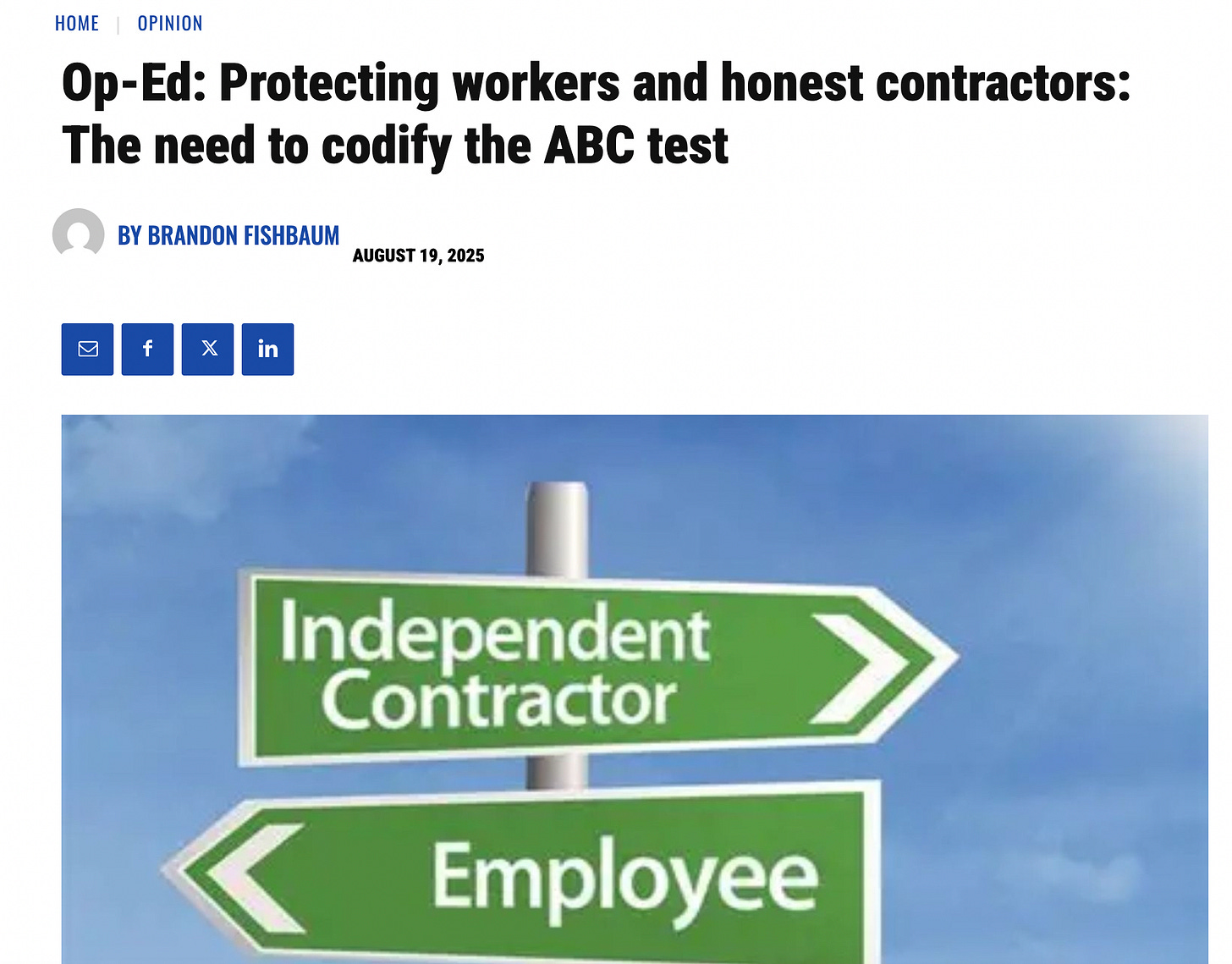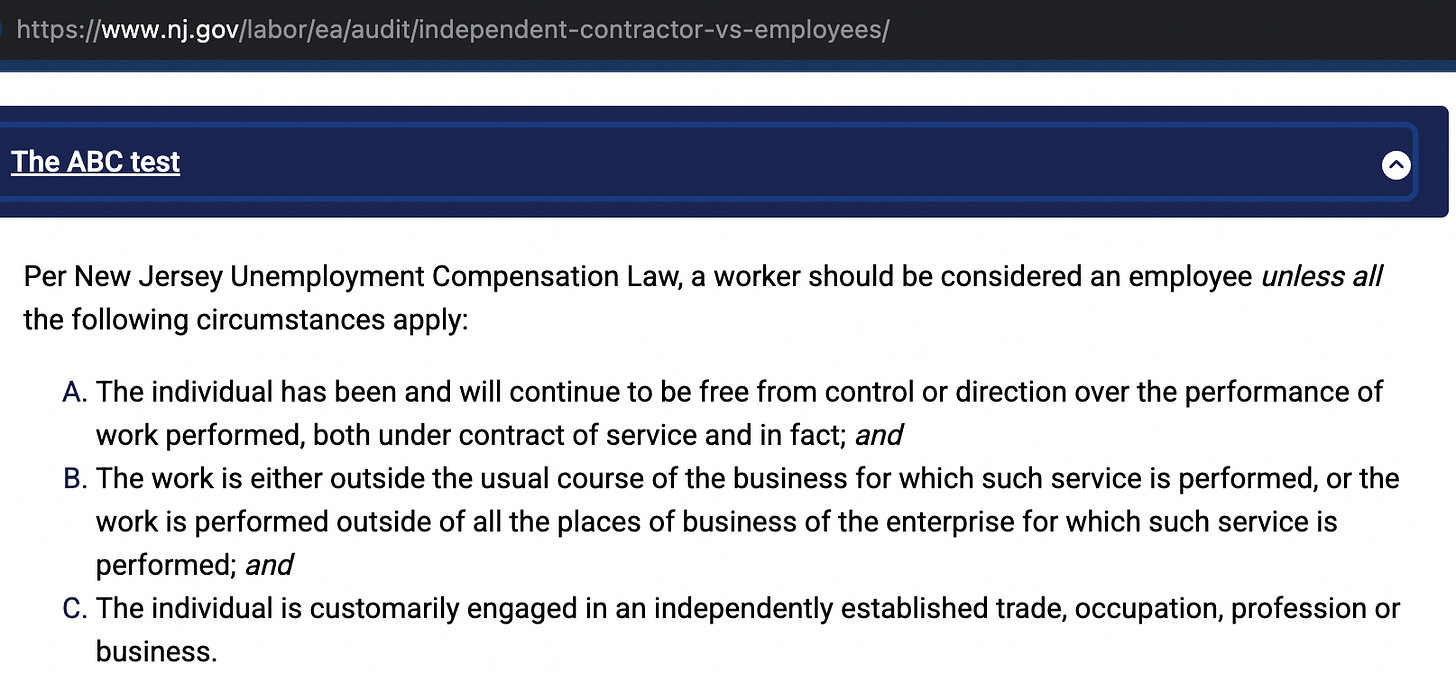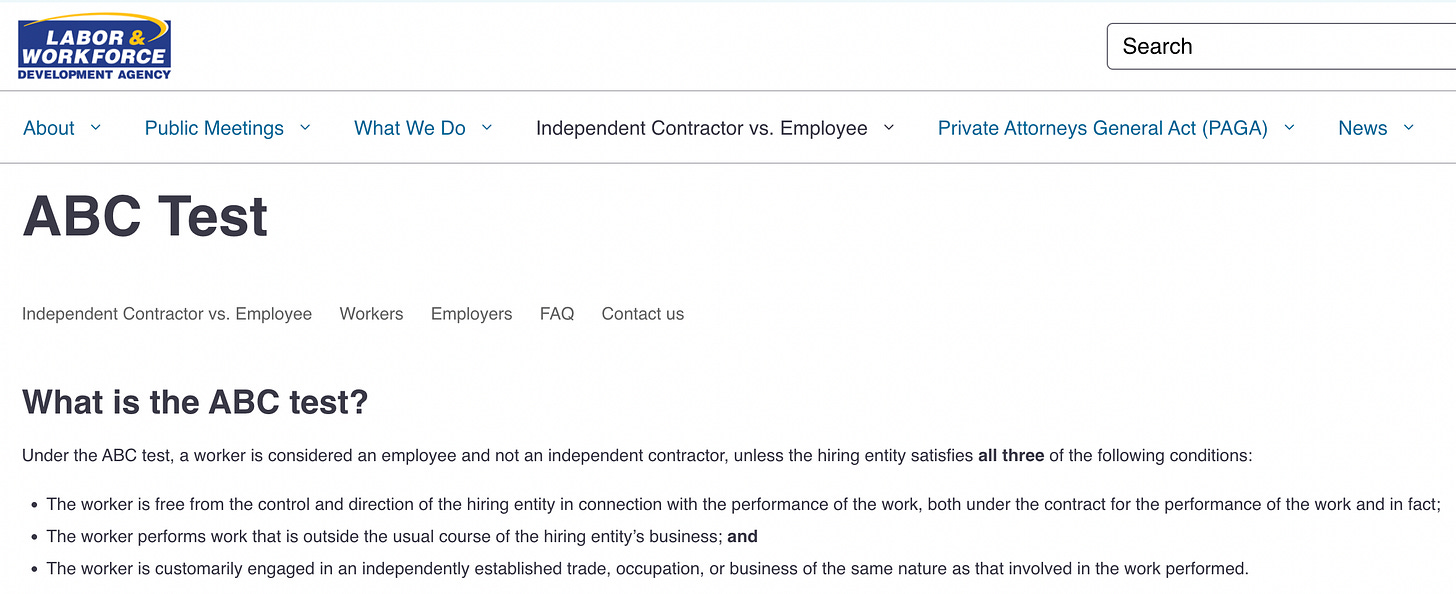Upsy-Daisy
In attempting to defend New Jersey's proposed independent-contractor rule, this op-ed revealed that California's freelance-busting version is the goal.
Back in June, when the New Jersey Department of Labor & Workforce Development held a public hearing about its proposed independent contractor rule, the only people who testified in favor of it were either employed by unions, or affiliated with organizations that have strong union ties.
Those people included Brandon Fishbaum of Carpenter Contractor Trust. He spoke for just about 90 seconds, and he offered no data, research or anything of the sort to back up his claims:
Yesterday, BINJE published an op-ed by Fishbaum. He writes about the interpretation of ABC Test regulatory language that New Jersey’s Labor Department is trying to impose through rule-making. The op-ed’s headline suggests that anyone who is an “honest” independent contractor would support the Labor Department’s proposal:
Fishbaum wrote in his op-ed:
“The ABC Test isn’t new. It’s been part of our case law and enforcement standards for years.”
A few paragraphs later, Fishbaum writes:
“Some critics claim this rule is overreaching. Which is just untrue because the changes don’t alter the law but instead affirm it, a long-overdue approach. The appeal is the test’s simplicity. These include:
The worker must be free from control and direction.
The work performed must be outside the usual course of the business.
The worker must be engaged in an independently established trade or business.
“These aren’t unreasonable requirements; it’s common sense.”
It’s something, all right, but it’s definitely not common sense.
Those aren’t even the three prongs of New Jersey’s ABC Test regulatory language.
The ABCs of Freelance Busting
What Fishbaum wrote is, in fact, a version of California’s ABC Test regulatory language that has proved destructive to independent contractors in hundreds of professions.
Here is the existing ABC Test in New Jersey. Look in particular at Prong B:
Now, look at Prong B of the ABC Test in California:
As you can see, the second half of Prong B is gone in the California version, compared to how it’s written in the two-part New Jersey version of Prong B.
Now, look again at what Fishbaum wrote:
“… the changes don’t alter the law but instead affirm it, a long-overdue approach. The appeal is the test’s simplicity. These include:
The worker must be free from control and direction.
The work performed must be outside the usual course of the business.
The worker must be engaged in an independently established trade or business.”
Your eyes do not deceive you. There is no second part of Prong B in what Fishbaum wrote.
Why does it matter if the second part of Prong B is missing when it comes to the way New Jersey is proposing to interpret this regulatory language?
Here’s attorney Alex MacDonald of the Littler law firm, in a Q&A from August 13, based on the public comment he filed in opposition to New Jersey’s proposed rule:
“Under prong B, a worker can be an independent contractor when she works outside the hiring entity’s usual course of business, or places of business. This has long been understood to protect the independence of remote or ambulatory workers—installation crews, delivery drivers, salesmen going door to door, and so forth. These people satisfy the second prong-B option because they do not report to any fixed place of business, where they could be managed or supervised. Instead, they work in the field or locations of their own choosing, away from any direct oversight.
“The rule proposes to narrow that approach. It asserts that when companies do not have fixed places of business, their places of business are wherever their services are performed. Their places of business are wherever any ‘essential’ or ‘integral’ services are performed. For example, the rule says that for some app-based companies, like rideshare or delivery-network companies, the places of business include a worker’s car. That means a driver invariably fails the ‘places of business’ option.
“That is not, however, what the statute says. The statute sets out two options for workers who want to work independently: a worker can be independent when she works outside the normal course of business or the usual places of business. And under normal rules of statutory interpretation, each option must mean something.
“The Department cannot read one option out of the statute under the guise of interpreting it. It cannot delete words from the statute and rewrite the law.”
Now, I’m not a world-class lawyer like MacDonald. I’m a freelance writer and editor. Which means I may not throw around words like statute as often as he does, but I do deal with people deleting words on the regular.
That’s exactly what Fishbaum did in that op-ed. He deleted words while suggesting that those of us who disagree with him are somehow dishonest.
This whole deleting words thing is one of the reasons why independent contractors keep saying the federal Protecting the Right to Organize Act is a problem in Congress, too. Here’s the version of the ABC Test that it would inject into federal law, targeting every single independent contractor in the nation:
Yup, that’s correct: There’s no second half of Prong B in the PRO Act, either. It’s California-inspired freelance busting at the federal level. As the former chairman of the National Labor Relations Board wrote about the effect of this regulatory language in the federal bill:
“This is not a mere technical redefinition: it would substantially unravel and change large segments of the US economy and adversely affect millions of service providers who currently view themselves as independent contractors governed by their own entrepreneurial decisions.”
What’s so insidious about New Jersey’s proposed independent contractor rule is that—based on what attorneys like MacDonald are saying—the state is attempting to show freelance busters within the government how they could interpret other versions of the ABC Test as a California version.
The result of this approach in New Jersey, according to what attorney Richard Reibstein of Troutman Pepper Locke wrote, is that:
“This view of the second part of the ‘B prong’ almost entirely eviscerates any chance for most ICs and companies using their services from establishing the workers’ IC status.”
Again, I say exactly what I told the U.S. Senate HELP Committee when I testified on Capitol Hill last month—at a hearing where the only people at the table supporting this kind of policymaking, yet again, were either employed by unions, or affiliated with organizations that have strong union ties:
“This is not targeting employee misclassification. This is weaponizing regulatory language to attack independent contractors.”





